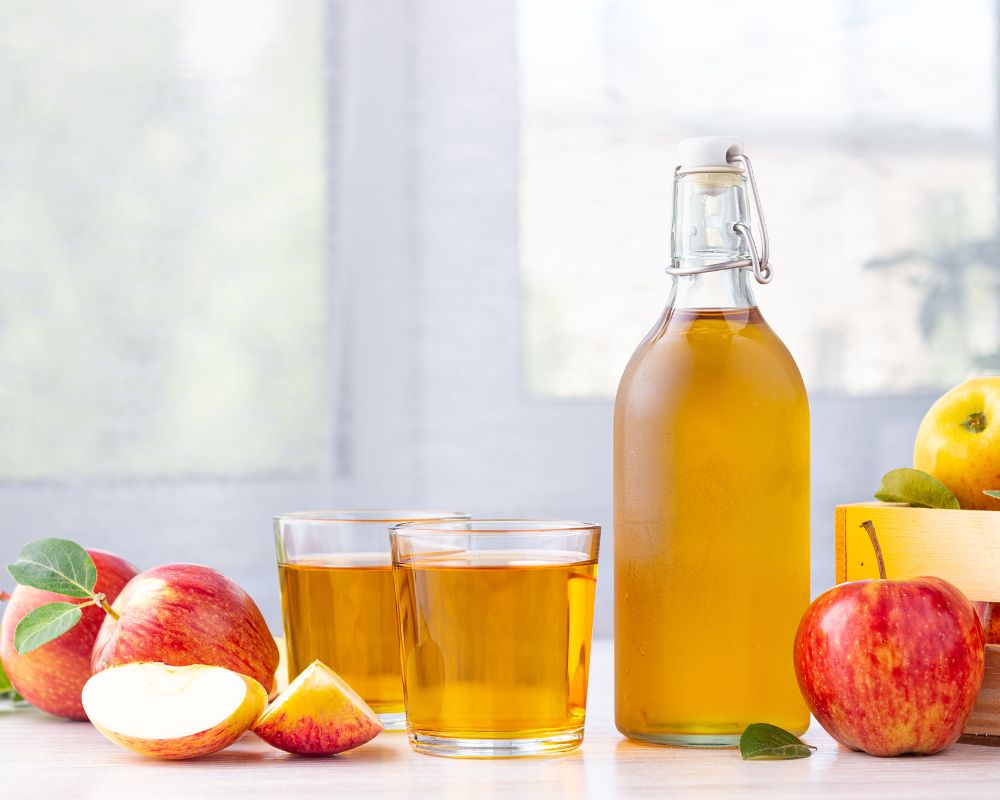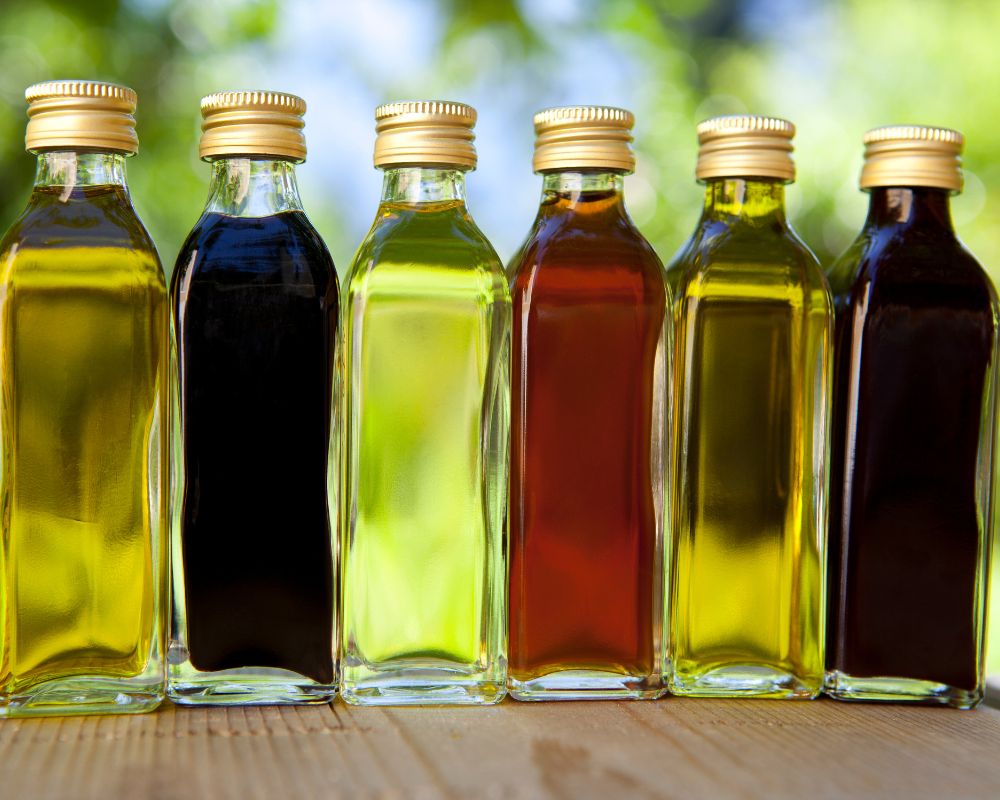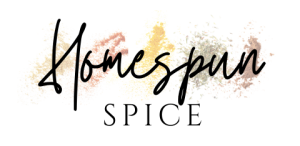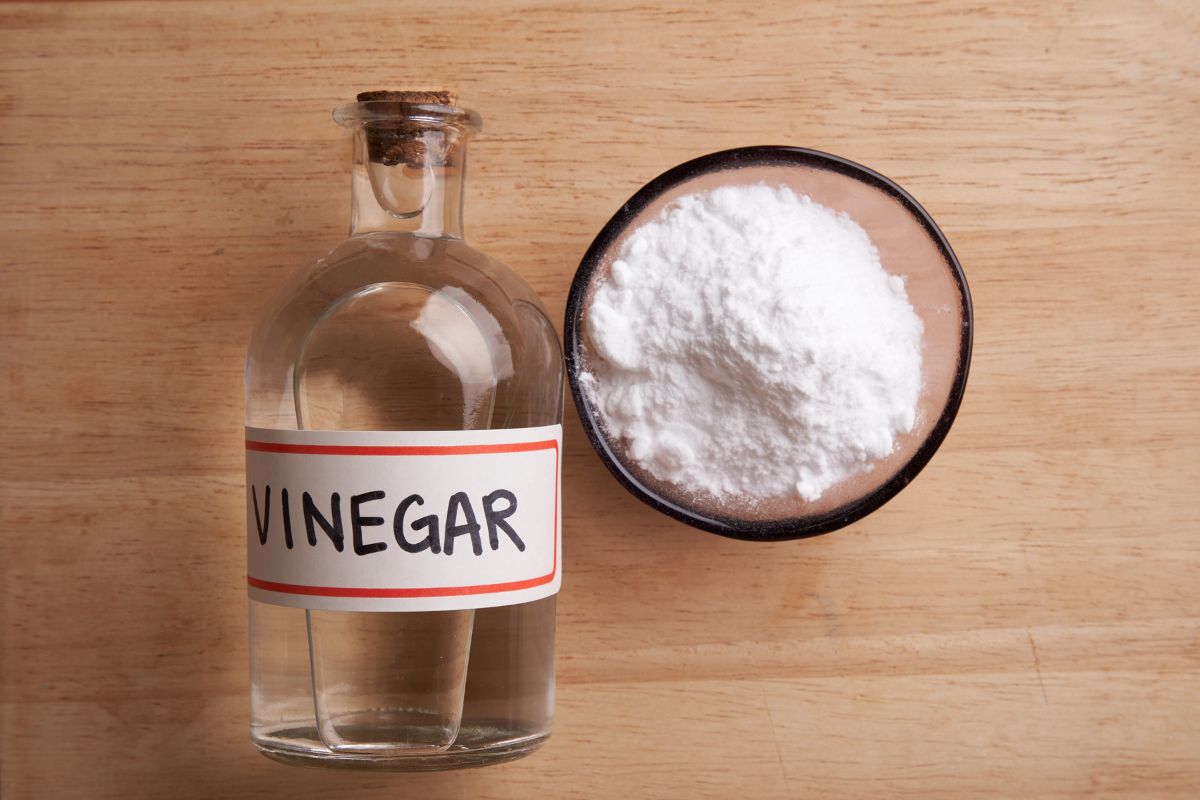Vinegar powder or powdered vinegar seasoning is a flavoring agent used to add the characteristic tangy, tart, sour, and vinegar flavor to dishes such as salt and vinegar potato chips, and popcorn. Depending on the type of vinegar, the fine-textured powder may be bright white, creamy white, light orange, pink, or dark cream to beige.
Table of Contents
What is vinegar powder?

Vinegar powder is a flavoring agent made by spraying maltodextrin with liquid vinegar and then drying it. The spice is also called powdered vinegar or dehydrated vinegar.
Maltodextrin acts as a carrier or an anti-caking agent. This complex carbohydrate is porous and has spaces filled with liquid vinegar. As an anti-caking agent, it prevents the mixture from clumping.
Vinegar powder is available in two forms — the IP version and the standard version.
IP or “Identity Preserve” vinegar powder means it is free from any genetically modified content. It’s made with IP maltodextrin and IP-modified food starch.
| Origin | Traceable to Babylonian times around 5,000 BCE |
| Appearance | A finely textured powder, color varies depending on the type of vinegar used |
| Flavor profile | All culinary vinegar powders have a characteristic acidic, tangy, sour, tart flavor |
Origin
Although medicinal and culinary vinegar use is traceable to Babylonian times around 5,000 BCE, vinegar powder is a relatively new concept. Today, it is a common cooking ingredient in European, North American, and Asian cuisines.
Vinegar powder comes from a specialized process where a machine sprays liquid vinegar on maltodextrin before the mixture is dried.
Appearance
Vinegar powder is a finely textured powder whose color varies depending on the type of vinegar used. Here’s a quick breakdown of the colors and the type of vinegar used to make the powder:
| Bright white | Distilled white vinegar |
| Creamy white | Apple cider vinegar |
| Dark cream to beige | Malt vinegar |
| Light orange | Balsamic vinegar |
| Pink or light purple | Red wine vinegar |
Flavor profile
All culinary vinegar powders have a characteristic acidic, tangy, sour, tart flavor. Only concentrated vinegar powder used for food preservation for its anti-microbial properties lacks the distinctive sour taste.
The ingredients in vinegar powder include maltodextrin, liquid vinegar, and modified food starch. The last ingredient may be missing in some recipes.
Nutritional Benefits of vinegar powder
Vinegar powder is a naturally safe food preservative, unlike artificial ones (sorbates and benzoates), which may cause neurological damage and cancer. The maltodextrin used in making the powder is safe since it is a complex starch, and only a tiny amount is required.
Like liquid vinegar, powdered vinegar contains helpful acetic acid, enzymes, malic acid, essential amino acids, biotin, folic acid, minerals, and small amounts of vitamins.
Acetic acid can help eliminate excess oils, dirt, and harmful bacteria from the skin. Additionally, apple cider vinegar powder may help balance the skin’s pH levels. Vinegar powder’s anti-inflammatory and antibacterial properties may also help fade stubborn acne scars.
Finally, apple cider vinegar powder can help soothe the scalp and cleanse the hair.
What is powdered vinegar used for?
Powdered vinegar is a critical flavoring agent to add a distinctive vinegar flavor to:
- Stews
- Soups
- Brining liquids
- Marinades
- Pickling liquids
- Seasoning blends
- Sauces
- Dry rubs
- Glazes
- Salad dressings
The most famous application of powdered vinegar is flavoring salt and vinegar potato chips, a delicacy for many people since the 1950s.
Are there some drawbacks to using vinegar powder?
Although vinegar powder is a highly versatile spice, you might want to hold back on it sometimes.
Most kinds of vinegar powders have zero sodium or only traces of it. Still, you may find some with high sodium content, which isn’t good for you if you are on a low-sodium diet.
Most vinegar powders won’t cause you any allergies when you consume them. However, allergic reactions may happen if you inhale the powder. If the issue gets out of hand, you may notice sneezing, throat irritations, and lung complications.
Some people, especially those with skin conditions, may also experience skin burns when they eat vinegar powder.
Where to buy vinegar powder?
Vinegar powder is hard to find in grocery stores, supermarkets, and spice outlets. Your best bets are online stores and web-based spice retailers.
However, watch out for store-bought vinegar powder packed in the same facility as other allergy-causative agents such as wheat, nuts, eggs, milk, and soy. Cross-contamination usually happens, so read the labels to be sure it’s safe to use if you’re allergic to these ingredients.
5 culinary uses of vinegar powder
- Vinegar powder is a vital seasoning or flavoring agent in dry seasoning blends and rubs to impart a vinegar flavor to dishes. As a dry garnish, it is popular as a French fries, chicken wings, and popcorn seasoning agent.
- Use vinegar powder for a unique vinegar flavor in meat marinades.
- Liquid food products such as brines, pickling liquids, barbecue sauces, soups, stews, and salad dressings also do great with vinegar powder’s tangy, sour effect.
- In recipes requiring an acidic flavor, vinegar powder is an excellent substitute for tartaric acid, ascorbic acid or vitamin C powder, and citric acid.
- Most cooks prefer using vinegar powder to add flavor to food items without all the sogginess of liquid vinegar. It works well when you want to keep your food as dry as possible.
3 non-culinary uses
- You can use vinegar powder as a powerful household cleaner. Pour some powder on a surface, spray it with water, and let it rest for several minutes before scrubbing.
- Vinegar powder also functions as an insect repellent. Reconstitute it with water and pour it into a spray bottle to spray directly on annoying houseflies and mosquitoes.
- A fun way to use vinegar powder at home is to reconstitute it with water and mix it with baking soda to make home volcanoes. The effect is fun, but you must take care when performing such activities in closed spaces.
Does vinegar powder expire?
Vinegar powder can expire, even though the liquid vinegar it comes from may last indefinitely when stored in ideal conditions.
Powdered vinegar expires when exposed to moisture. It absorbs moisture from the air and forms clumps that you must break up before you use it.
The good news is that vinegar powder doesn’t lose flavor and aroma.
How do you make vinegar powder?

You can make your own vinegar powder at home, but it won’t be easy and practical.
Vinegar powder is best made in industrial settings, requiring specialized machines to spray liquid vinegar onto maltodextrin.
What’s more, it’s hard to find information that’s 100% clear on how to make vinegar powder at home. The few procedures you may find online are complicated and risky.
That said, if you get around to making your own vinegar powder someday, you can use any of the following types of vinegar:
| Apple cider vinegar | To make apple cider vinegar powder |
| Balsamic vinegar | To make balsamic vinegar powder |
| Cava wine vinegar | For cava vinegar powder |
| Distilled white vinegar | For distilled white vinegar powder |
| Malt vinegar | To make malt vinegar powder |
| Red wine vinegar | For red wine vinegar powder |
| Rice vinegar | For rice vinegar powder |
| Sherry wine vinegar | To make sherry vinegar powder |
| Spirit vinegar | For spirit vinegar powder |

